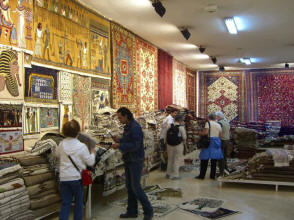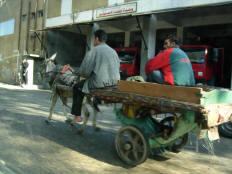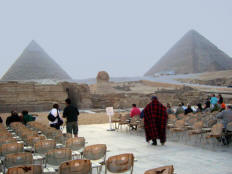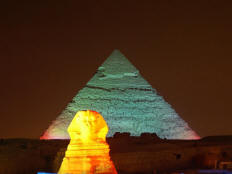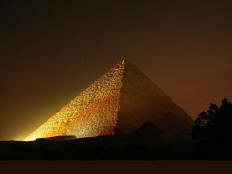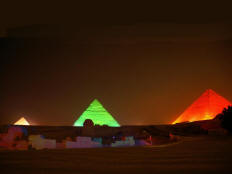Page 1 2 3 4 5 6 7 8 9 10 11 12 13 14 15 16 17 18 19 [History]
Tuesday, 10 April (continued). Our bus left at noon for an
optional tour to Sakkara ($50), also once part of the great necropolis of Memphis. We stopped for a buffet lunch at a huge
restaurant on the way and got to the necropolis at 13:45. We entered the complex
through a long colonnade, about all that remains of the once grand funerary
temple. By now the sun was extremely hot, and we all stood in the shade of a
high wall as Salah gave us an interesting
lecture on the evolution of the pyramids.
Sakkara is the site of the "step pyramid" of Pharaoh Djoser, the oldest of
Egypt's 97 surviving pyramids (built c.2630 B.C.). The reason it survived seems
obvious; it was built of stone. Nearby we saw several other more recent
pyramids, including that of Unas, built centuries later (c.2350 B.C.), but of
mud bricks, and now looking much like a pile of dirt.
Nevertheless, it's doubtful there were earlier mud brick pyramids. Djoser's is believed to be the first Egyptian pyramid precisely because it apparently didn't start out to be a pyramid at all. The original structure was a square platform (mastaba) covering the royal burial chamber, a very common structure for many centuries past (though usually rectangular). In successive steps, additional mastabas were added on top until there were the six tiers, forming the step pyramid we see today. Thus the tradition of pyramid building started as a sophistication of the much older idea of a mastaba. It was basically stacking several mastabas.
Later, as we explored the area, the gentle, cooling breeze we'd been enjoying earlier grew much stronger, and we were treated to our own little sand storm. That made it very difficult to stay out in the open, and everyone in our group started heading for the buses early. At 15:00 the buses left for a visit to a "carpet school," really a gigantic
carpet store for tourists. We did see some looms being worked, but they couldn't
possibly have made more than a few percent of the carpets being sold. Some of
the carpets were fairly traditional in design, but many had very distinctively
Egyptian motifs.
Our bus finally left the carpet store at 16:15 and we got to our room at the hotel about 17:00. Since we had to be back on the bus by 17:30 for the optional Sound and Light show at Giza ($29), it was a real rush just to wash the sand off. We didn't have time to change into warmer clothes, but we did grab our jackets. The bus driver knew a shortcut, off the main highway and through some residential neighborhoods. Despite their high-rise residences and proximity to Cairo, the people here were "villagers" according to Salah. They dressed like country folk, and there were more donkeys and donkey-carts on the road than automobiles. The bus took us to the entrance by the Sphinx which is right in the town of Giza, so we had a completely different perspective than we'd had this morning. The Sound and Light show started promptly at 18:30 (even though it still wasn't dark) and we just barely made it. The show was pretty much the usual, with different colored flood lights on various combinations of the pyramids and the Sphinx, and a narration on the splendor of Ancient Egypt. The bus had us back to the Marriott about 20:15. We hadn't eaten, so we though we'd try the Marriott Bakery, the hotel's sandwich shop, for a quick bite. Several others from our group did the same. The food was quite good. We got to our room around 21:00 and went right to bed. With three separate "events," it had been a long and busy day. Page 1 2 3 4 5 6 7 8 9 10 11 12 13 14 15 16 17 18 19 [History]
Copyright © 2000-2023 DarrellPeck.com All rights
reserved. | |||||||









